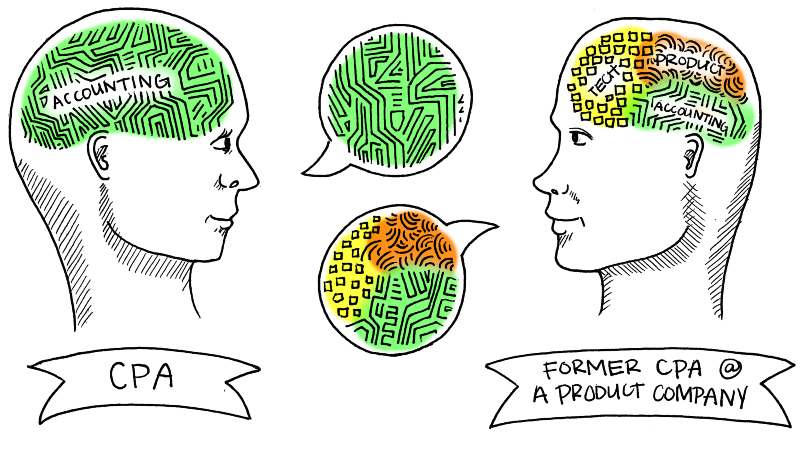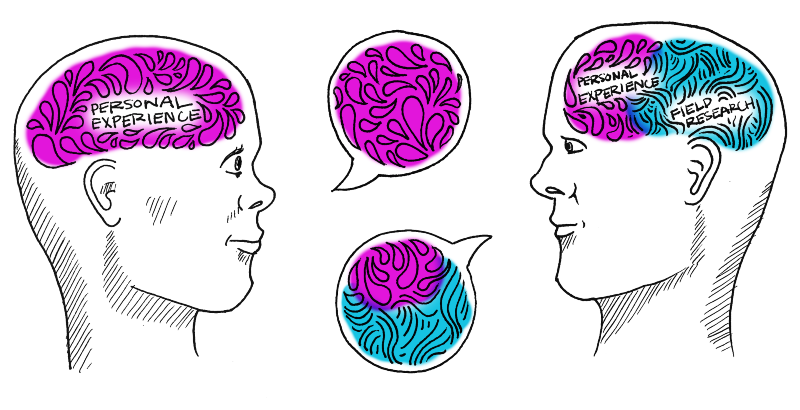Jenea Hayes was so fascinating to talk to. She has undergraduate and graduate degrees in cognitive psychology, a field I know very little about, and I wish we could have gone into more detail about the kinds of things our brains our wired to do that influence how a user experience is designed. Jenea did give me some cognitive psychology feedback on one of my questions, though. When I asked her what she thought her teenage self thought adult life would be like she told me, "as a cognitive psychologist, I have to say that nobody knows what they thought about what they would do when they were an adult." I'm going to have to rethink that question!
Jenea wrote this piece for Cooper's Journal last year, titled "Invest in Brains." I wanted to share it because it give some more insight into what she does and how that fits into her what she told us about how "design is really about understanding people."
There's a special kind of fear-mongering you see in certain circles that always gets my goat. It goes something like this: "[some new behavior that people are suspicious of] has been shown to make detectable changes to the brain!" The implication of this is that the new behavior must be bad because it alters the brain from some perceived pure or natural state.
Is there other language we can use when talking about experience leading to changes in the brain? Yes, yes there is. It's very simple. It's called learning. (Next time you read one of those fear-mongering statements, replace "changes to the brain" with "learning" and see if it sounds so scary.)
The fact is that having experiences and interacting with the world leads to changes in the brain. And this is a good thing; these changes ("learnings") help you function in the world. When you first learn to drive it is difficult to coordinate all the different skills you need to be effective, until your brain develops the connections to make it easier. Once you've learned how to drive, your brain is different from the brains of people who don't know how to drive.
We all experience the world through our own brains, and past experiences influence what and how we perceive and remember. Consider the phrase "Liberté égalité fraternité." Your brain will respond very differently if you do or do not speak French since very different brain structures will get involved. It will respond differently if you have or have not studied French history because you will or will not be able to link the phrase to other information stored in memory.
This is why it makes me very nervous when clients want to replace field research with internal subject matter experts who were once a member of their target audience. Take for example the hypothetical case of an accountant who joins a product company creating software for CPAs. The fact is that the experience of working at a product company (learning about the underlying technology, watching the software go through various iterations, focusing on business objectives and constraints) produces a different kind of brain than a CPA who spends that time, well, accounting. Don't get me wrong, it can be incredibly valuable to have that person to learn from, but their brain will respond differently than the brains of the end user. They should not be considered members of the target audience any longer.
Illustrations created by Cale Leroy.
Similarly, going through the experience of field research, of seeing end users struggle to achieve their goals, of hearing the kind of language they choose and the stories they tell, of getting to know them as actual human beings and not bullet points on a research report, all of this changes your brain. It changes your brain in a very useful way. It makes your brain better at making design decisions for those end users because it brings into play your social animal skills of empathy and compassion. A brain that has gone through that experience is a very valuable brain, indeed. And there is no other way to modify the brain than through experience.
Illustrations created by Cale Leroy.
Look, I get it. I know you don't have the time or money for another big research initiative, and you have all the market- and design-research insights you really need for this stage of the process. But if you are serious about user-centered design, then you should be investing in the brains of your product team by giving them the experience of talking directly to your end users. This is a no-brainer for designers (ha! see what I did there?), but this also goes for product managers, developers, customer service reps, and so on, basically anyone whose decisions or behaviors impact your customers' experience. Importantly, this goes for every new member who joins your team also, even if they're brains you're only borrowing for now (e.g. design consultants). Even if it just means a handful of interviews over Skype or watching videos of previous research efforts, some direct exposure to actual end users makes all the difference.
You have to invest in every brain, because these brains will make different, they will make better, user-centered product decisions.


